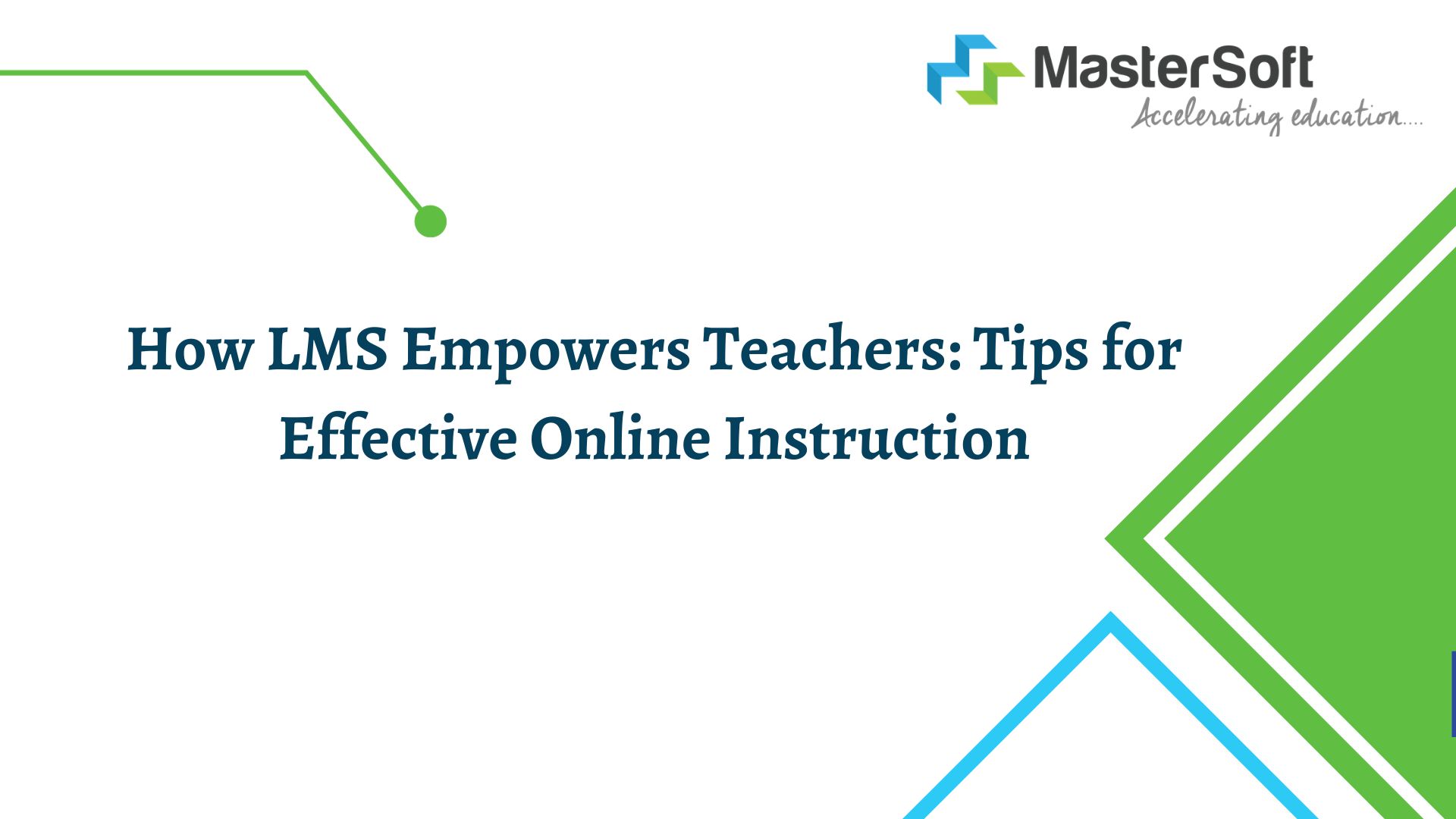How Learning Management Systems Empowers Teachers

In the rapidly evolving landscape of education, Learning Management Systems (LMS) have emerged as powerful tools that empower teachers to deliver effective online instruction. The advent of LMS has transformed the way educators engage with students, create engaging content, and track progress. In this comprehensive guide, we’ll explore how LMS empowers teachers and provide valuable tips for successful online instruction. Whether you’re an experienced educator or new to the world of online teaching, these insights will help you harness the full potential of LMS to make a positive impact on your students.
Chapter 1: Understanding the Significance of LMS in Education
Before we delve into the tips for effective online instruction, let’s establish the importance of Learning Management Systems in the education landscape.
What is LMS?
A Learning Management System is a software platform that allows educators to create, manage, and deliver educational content, as well as track and assess student performance.
The Role of LMS in Education
LMS platforms serve as centralized hubs for course materials, assignments, assessments, and communication. They facilitate the organization and delivery of content, making it easier for both educators and students to engage in the learning process.
Chapter 2: Empowering Teachers with LMS
LMS platforms provide educators with a variety of tools and features that enhance their ability to deliver effective online instruction. Let’s explore these empowerment factors.
1. Centralized Content Management
LMS platforms allow educators to organize and manage all course content in one place. This streamlines content delivery and makes it more accessible to students.
2. Customization
LMS platforms often offer customization features that allow educators to tailor their courses to the specific needs of their students. This enables a more personalized learning experience.
3. Collaboration Tools
LMS platforms include communication tools like discussion boards, chat, and email, facilitating interaction between students and instructors. This fosters a sense of community in the online learning environment.
4. Assessment and Analytics
LMS platforms provide tools for creating, delivering, and grading assignments and assessments. Instructors can use analytics to track student performance and identify areas where additional support is needed.
5. Progress Tracking
Educators can monitor student progress through the LMS, allowing them to provide timely feedback and interventions when necessary.
Chapter 3: Tips for Effective Online Instruction with LMS
Now that we understand the empowerment factors, let’s explore practical tips for effective online instruction using LMS.
1. Familiarize Yourself with LMS
Before diving into online instruction, take the time to familiarize yourself with the LMS platform you’ll be using. Learn how to navigate the system, create content, and use communication tools effectively.
2. Create a User-Friendly Course Structure
Organize your course in a clear, intuitive manner. Ensure that students can easily find materials, assignments, and assessments. A well-structured course reduces confusion and enhances the learning experience.
3. Embrace Multimedia
Leverage the multimedia capabilities of LMS platforms. Incorporate videos, interactive content, and visual elements to make your instruction more engaging and effective.
4. Establish Clear Communication
Set expectations for communication with your students. Let them know how and when you will be available for questions and assistance, and encourage active participation in discussions.
5. Encourage Time Management
Online instruction allows for flexibility, but it’s important to establish a schedule for students. Provide due dates for assignments and assessments, allowing students to manage their time effectively.
6. Provide Timely Feedback
Use the assessment and analytics tools of the LMS to provide prompt feedback on assignments and assessments. Constructive feedback is crucial for student improvement.
7. Foster Student Engagement
Promote active engagement through discussions, group projects, and interactive activities. Encourage students to connect with their peers and make the most of the online learning community.
8. Embrace Diverse Assessment Methods
Use a variety of assessment methods, such as quizzes, written assignments, and peer evaluations. Diverse assessments cater to different learning styles and provide a more comprehensive evaluation of student understanding.
9. Address Technical Issues
Acknowledge that technical issues can arise in online learning. Have a plan in place for addressing common technical problems and provide guidance to students on how to resolve them.
10. Stay Updated and Adapt
Education is continually evolving. Stay informed about new technologies, teaching strategies, and best practices in online instruction. Be prepared to adapt and update your courses as needed.
Chapter 4: LMS and the Future of Education
As technology continues to advance, the role of LMS in education is set to evolve. Let’s explore the potential trends and developments.
1. Artificial Intelligence (AI)
AI-driven features in LMS will offer personalized learning experiences, including tailored content recommendations and automated grading.
2. Mobile Learning
LMS platforms will prioritize mobile compatibility, allowing learners to access content on various devices.
3. Gamification
Gamified elements within LMS will make learning more engaging and enjoyable for students.
4. Virtual Reality (VR) and Augmented Reality (AR)
Immersive technologies like VR and AR will create interactive and engaging learning experiences.
Chapter 5: Conclusion
In conclusion, Learning Management Systems empower educators to deliver effective online instruction by providing tools and features that enhance content delivery, communication, assessment, and progress tracking. By following the tips outlined in this guide, educators can make the most of LMS platforms and create engaging and effective online learning experiences for their students. As technology continues to shape the future of education, LMS platforms will continue to play a pivotal role in delivering flexible and impactful learning experiences. Embrace these strategies, stay informed about emerging trends, and unlock the full potential of LMS in your educational journey.
hapter 6: The Evolving Role of Educators
In the context of LMS-driven online instruction, educators’ roles are undergoing a significant transformation. Teachers are no longer just providers of information; they are curators of knowledge, facilitators of discussions, and mentors for their students.
Facilitators of Learning
In an LMS-powered environment, educators facilitate the learning process by guiding students, answering questions, and fostering discussions. They act as a source of inspiration and support for their students’ educational journey.
Content Creators
With LMS platforms, educators have the ability to create and curate course content, making learning materials more engaging and relevant. They can compile resources, design interactive activities, and adapt content to suit diverse learning styles.
Data Analysts
LMS platforms provide a wealth of data on student performance and engagement. Educators can analyze this data to gain insights into the effectiveness of their instruction and identify areas where students may need additional support.
Personalization Experts
One of the most powerful aspects of LMS is the ability to personalize learning experiences. Educators can use the platform’s tools to tailor instruction to individual students, addressing their strengths and weaknesses, and catering to their unique learning preferences.
Chapter 7: Overcoming Challenges in Online Instruction
While LMS platforms empower educators in various ways, online instruction is not without its challenges. It’s essential to address these challenges to ensure effective teaching and learning.
1. Technical Issues
Educators and students may encounter technical problems, such as connectivity issues, software glitches, or device compatibility problems. Being prepared to troubleshoot these issues is crucial.
2. Maintaining Engagement
Sustaining student engagement in an online environment can be a challenge. Educators must employ strategies that keep students actively participating in the learning process.
3. Building a Sense of Community
In a virtual classroom, fostering a sense of community and connection among students can be challenging. Educators should encourage interaction, collaboration, and discussion.
4. Assessment Integrity
Online assessments can be susceptible to academic dishonesty. Educators must employ strategies and tools to ensure the integrity of assessments, such as proctoring or alternative assessment methods.
Chapter 8: Preparing for the Future of Education
As we look ahead, the future of education holds exciting possibilities. The continued evolution of LMS and educational technology will shape the way we teach and learn. Educators should be prepared to adapt to these changes.
1. Lifelong Learning
In an era of rapid technological advancement, educators must embrace lifelong learning. Staying up to date with the latest educational technologies and pedagogical trends is essential to providing effective instruction.
2. Professional Development
Schools and institutions should invest in professional development for educators to ensure they have the skills and knowledge needed to leverage LMS and other technology effectively.
3. Blended Learning
The future of education is likely to incorporate blended learning, a mix of online and in-person instruction. Educators should be prepared to navigate this hybrid learning landscape.
4. Data-Driven Instruction
As LMS platforms continue to gather data, educators should become adept at using this information to inform their instructional decisions and improve student outcomes.
Chapter 9: Conclusion
In conclusion, Learning Management Systems play a pivotal role in empowering teachers to deliver effective online instruction. These platforms offer a range of tools and features that enhance content delivery, communication, assessment, and progress tracking. By implementing the tips and strategies outlined in this guide, educators can make the most of LMS platforms and create engaging and effective online learning experiences for their students.
As we journey into the future of education, it is crucial for educators to stay adaptable, embrace emerging technologies, and continue to be lifelong learners themselves. The role of educators is evolving, and with the right mindset and tools, they can shape the future of education in ways that empower and inspire the next generation of learners.



